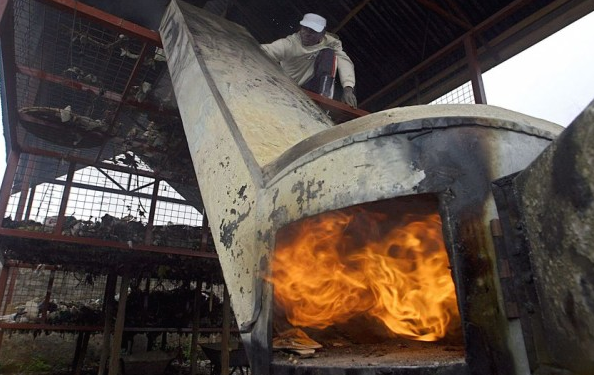A Texas turkey farm employee is now under quarantine after he tested positive for the Ebola virus. Texas Prime Turkey Farm, the largest supplier of turkeys in the United States, has been ordered by the CDC to quarantine over 250,000 holiday turkeys. The CDC has confirmed 3,000 turkeys have tested positive for the virus since Friday’s incident.
According to investigators, long time employee Philip Canseco was seen vomiting in the facilities restroom three days prior to the incident on Friday. “I was passing by the restroom, when I heard somebody throwing up inside,” said one Texas Prime Turkey Farm employee. “I opened the door and looked inside and saw Canseco throwing up in one of the urinals. I asked him if he was okay, he said yes, and I left. I didn’t want to get close to him and get sick.”
Management confirmed that Canseco worked three full work days at the facility with flu-like symptoms, before passing out unconscious with a fever of 106°. Due to his symptoms, he was rushed to a local hazmat tent where he tested positive for the Ebola virus. The CDC reports an additional 7 coworkers are being quarantined and tested. However, they have not released those results as of yet.
The facility has been ordered by the CDC to burn their entire flock of turkeys, over 250,000. Texas Prime Turkey Farm is requesting permission from the state of Texas to send the shipment of incinerated turkey ashes to Veolia’s Port Arthur environmental waste facility. This facility has already accepted one shipment of Ebola waste from household goods where Thomas Eric Duncan had stayed. Duncan was the first man to die of Ebola on US soil.
Activists are protesting the shipments of contaminated Ebola waste to their community. “We feel every precaution should be taken to protect our community, our children and our elderly. We are not a dumping ground for the nations, or the world’s bio waste.”
Plant manager Mitch Osborne said on Saturday that even though no contract has yet been signed, the plant will likely receive the second shipment of contaminated Ebola waste. “It is a safe and sound process,” Osborne said. “I am not going to place my employees in harms way, or the community. The company is here to improve the environment and I believe we are doing a pretty darn good job of that. I believe we are doing the right and safe thing.”
A spokesperson for Texas Prime Turkey Farm said there is a good chance Ebola turkeys may have already shipped out to major suppliers for distribution. Each retailer will have to perform recalls individually if they feel they have received a contaminated shipment.


